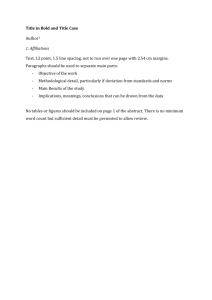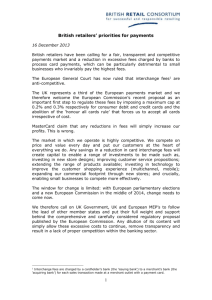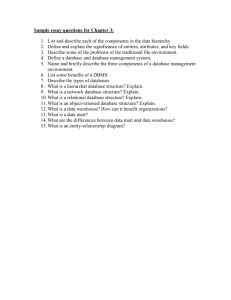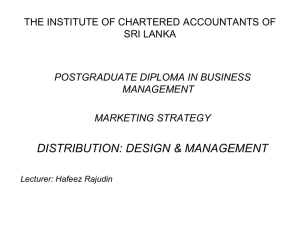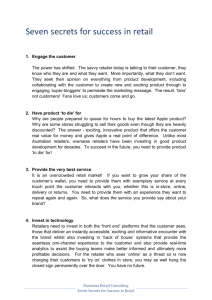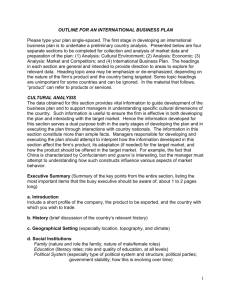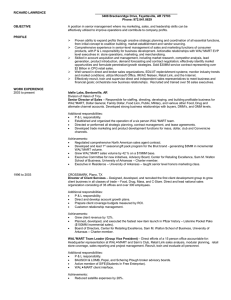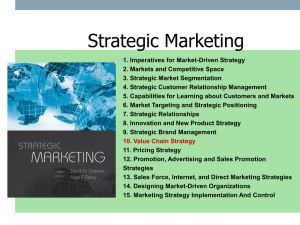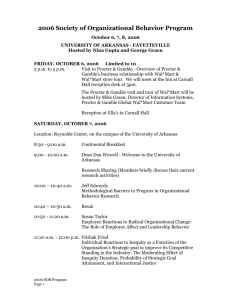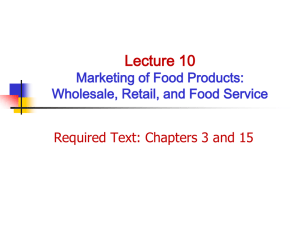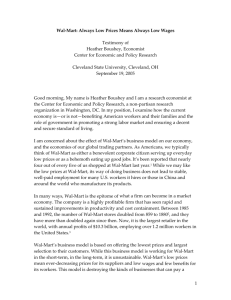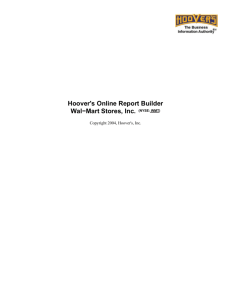Some of the key reasons for Success and Challenges for the Zanith
advertisement
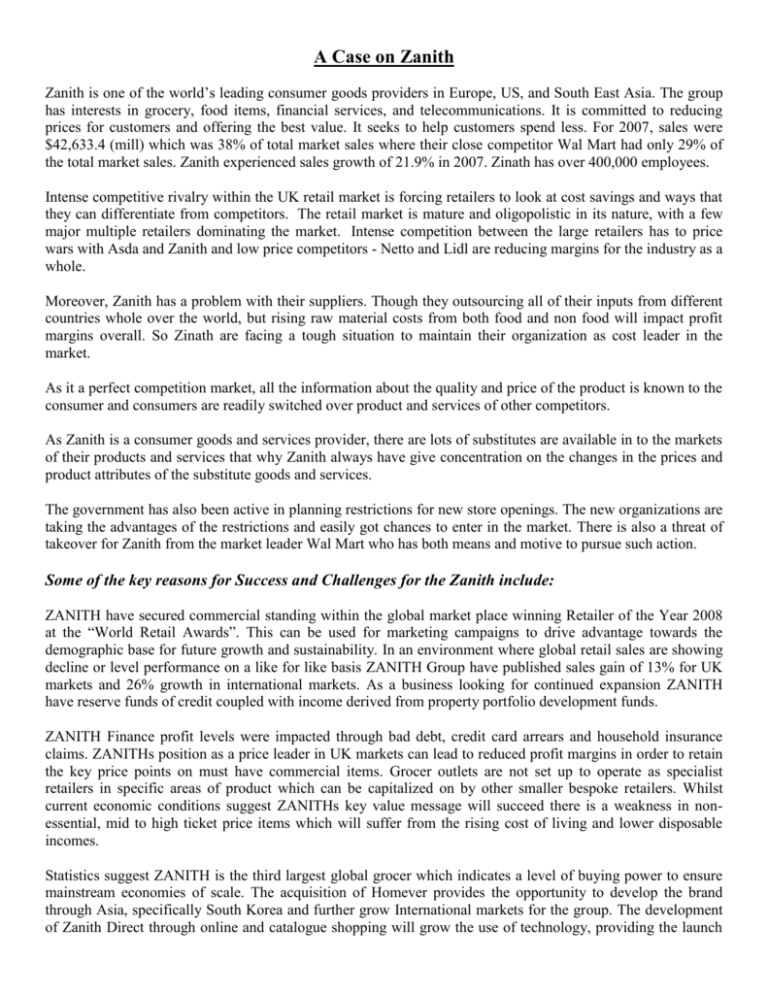
A Case on Zanith Zanith is one of the world’s leading consumer goods providers in Europe, US, and South East Asia. The group has interests in grocery, food items, financial services, and telecommunications. It is committed to reducing prices for customers and offering the best value. It seeks to help customers spend less. For 2007, sales were $42,633.4 (mill) which was 38% of total market sales where their close competitor Wal Mart had only 29% of the total market sales. Zanith experienced sales growth of 21.9% in 2007. Zinath has over 400,000 employees. Intense competitive rivalry within the UK retail market is forcing retailers to look at cost savings and ways that they can differentiate from competitors. The retail market is mature and oligopolistic in its nature, with a few major multiple retailers dominating the market. Intense competition between the large retailers has to price wars with Asda and Zanith and low price competitors - Netto and Lidl are reducing margins for the industry as a whole. Moreover, Zanith has a problem with their suppliers. Though they outsourcing all of their inputs from different countries whole over the world, but rising raw material costs from both food and non food will impact profit margins overall. So Zinath are facing a tough situation to maintain their organization as cost leader in the market. As it a perfect competition market, all the information about the quality and price of the product is known to the consumer and consumers are readily switched over product and services of other competitors. As Zanith is a consumer goods and services provider, there are lots of substitutes are available in to the markets of their products and services that why Zanith always have give concentration on the changes in the prices and product attributes of the substitute goods and services. The government has also been active in planning restrictions for new store openings. The new organizations are taking the advantages of the restrictions and easily got chances to enter in the market. There is also a threat of takeover for Zanith from the market leader Wal Mart who has both means and motive to pursue such action. Some of the key reasons for Success and Challenges for the Zanith include: ZANITH have secured commercial standing within the global market place winning Retailer of the Year 2008 at the “World Retail Awards”. This can be used for marketing campaigns to drive advantage towards the demographic base for future growth and sustainability. In an environment where global retail sales are showing decline or level performance on a like for like basis ZANITH Group have published sales gain of 13% for UK markets and 26% growth in international markets. As a business looking for continued expansion ZANITH have reserve funds of credit coupled with income derived from property portfolio development funds. ZANITH Finance profit levels were impacted through bad debt, credit card arrears and household insurance claims. ZANITHs position as a price leader in UK markets can lead to reduced profit margins in order to retain the key price points on must have commercial items. Grocer outlets are not set up to operate as specialist retailers in specific areas of product which can be capitalized on by other smaller bespoke retailers. Whilst current economic conditions suggest ZANITHs key value message will succeed there is a weakness in nonessential, mid to high ticket price items which will suffer from the rising cost of living and lower disposable incomes. Statistics suggest ZANITH is the third largest global grocer which indicates a level of buying power to ensure mainstream economies of scale. The acquisition of Homever provides the opportunity to develop the brand through Asia, specifically South Korea and further grow International markets for the group. The development of Zanith Direct through online and catalogue shopping will grow the use of technology, providing the launch pad for larger non food based products with moderate to high margin returns and less focus on sales and margin per foot return to space. ZANITH mobile have grown ¼ million customers in 2008 and moved into profitable status suggesting further growth and development within this technological area can be developed. UK and American markets have been affected by economic concerns through the “credit crunch”. Lower available income will impact and strategic focus may need to change to lower priced basic products with less focus on higher priced brands suggesting a switch in price architecture. Rising raw material costs from both food and non food will impact profit margins overall. Sourcing changes to Far East locations with regards exporting restrictions on some non food product areas will reduce margin rates on products with already low margins. Changes to consumer buying behaviors require further analysis - as technology develops consumer buying patterns change which will result in product areas requiring evaluation. For Zanith there is a persistent threat of takeover from the market leader Wal-Mart who has both means and motive to pursue such action. Sales and Market Related Information: The industry where Zanith are operating there business is a matured industry. Intensive price competition will lead the Zanith as the second highest competitor in the market. For 2007, sales were $42,633.4 (mill) which was 38% of total market sales where their close competitor Wal Mart had only 29% of the total market sales. Zanith experienced sales growth of 21.9% in 2007. Market leader is Wal Mart but in the year of 2007 Zanith sales revenue was 9% higher than the market leader. The top management will know that the growth in the sales of 2007 is not the indication of market leader. They are now thinking to sustain in that level by opening more outlets in the different countries. Basically their target is in the Asian countries. They are also planning to establish their won Brand though they have lots of product in their product line with their own brand. They also decide to introduce new products and services in their consumer product line. But the main problem is that they have no separate Research & Development team. N.B.: This case only for using study purpose. Copy right@EDUCARE A Case Study Zanith Group: Sustain in the market place with vulnerable environment Introduction: Zanith is one of the world’s leading consumer goods providers in Europe, US, and South East Asia. The group has interests in grocery, food items, financial services, and telecommunications. It is committed to reducing prices for customers and offering the best value. It seeks to help customers spend less. For 2007, sales were $42,633.4 (mill) which was 38% of total market sales where their close competitor Wal Mart had only 29% of the total market sales. Zanith experienced sales growth of 21.9% in 2007. Zinath has over 400,000 employees. Problem Statement: Sustain in the marketplace with intense price competition. Analysis of the Business Environment of Zanith with Michel Porters Five Forces Model: Threats of New Entrance The government has also been active in planning restrictions for new store openings. The new organizations are taking the advantages of the restrictions and easily got chances to enter in the market. There is also a threat of takeover for Zanith from the market leader Wal Mart who has both means and motive to pursue such action. Threats from Supplier Moreover, Zanith has a problem with their suppliers. Though they outsourcing all of their inputs from different countries whole over the world, but rising raw material costs from both food and non food will impact profit margins overall. So Zinath are facing a tough situation to maintain their organization as cost leader in the market. Rivalry among Competitors Intense competitive rivalry within the UK retail market is forcing retailers to look at cost savings and ways that they can differentiate from competitors. The retail market is mature and oligopolistic in its nature, with a few major multiple retailers dominating the market. Intense competition between the large retailers has to price wars with Asda and Zanith and low price competitors - Netto and Lidl are reducing margins for the industry as a whole. Buyer Bargaining Power As it a perfect competition market, all the information about the quality and price of the product is known to the consumer and consumers are readily switched over product and services of other competitors. Threats of Substitute Product As Zanith is a consumer goods and services provider, there are lots of substitutes are available in to the markets of their products and services that why Zanith always have give concentration on the changes in the prices and product attributes of the substitute goods and services. SWOT Analysis of Zanith: Strengths ZANITH have secured commercial standing within the global market place winning Retailer of the Year 2008 at the “World Retail Awards”. This can be used for marketing campaigns to drive advantage towards the demographic base for future growth and sustainability. In an environment where global retail sales are showing decline or level performance on a like for like basis ZANITH Group have published sales gain of 13% for UK markets and 26% growth in international markets. As a business looking for continued expansion ZANITH have reserve funds of credit coupled with income derived from property portfolio development funds. Weaknesses ZANITH Finance profit levels were impacted through bad debt, credit card arrears and household insurance claims. ZANITHs position as a price leader in UK markets can lead to reduced profit margins in order to retain the key price points on must have commercial items. Grocer outlets are not set up to operate as specialist retailers in specific areas of product which can be capitalised on by other smaller bespoke retailers. Whilst current economic conditions suggest ZANITHs key value message will succeed there is a weakness in non-essential, mid to high ticket price items which will suffer from the rising cost of living and lower disposable incomes. Opportunities Statistics suggest ZANITH is the third largest global grocer which indicates a level of buying power to ensure mainstream economies of scale. The acquisition of Homever provides the opportunity to develop the brand through Asia, specifically South Korea and further grow International markets for the group. The development of Zanith Direct through online and catalogue shopping will grow the use of technology, providing the launch pad for larger non food based products with moderate to high margin returns and less focus on sales and margin per foot return to space. ZANITH mobile have grown ¼ million customers in 2008 and moved into profitable status suggesting further growth and development within this technological area can be developed. Threats UK and American markets have been affected by economic concerns through the “credit crunch”. Lower available income will impact and strategic focus may need to change to lower priced basic products with less focus on higher priced brands suggesting a switch in price architecture. Rising raw material costs from both food and non food will impact profit margins overall. Sourcing changes to Far East locations with regards exporting restrictions on some non food product areas will reduce margin rates on products with already low margins. Changes to consumer buying behaviors require further analysis - as technology develops consumer buying patterns change which will result in product areas requiring evaluation. For ZANITH there is a persistent threat of takeover from the market leader Wal-Mart who has both means and motive to pursue such action. Strategies Zanith are following: Cost leadership strategies with few differentiations. Ansoff Matrix Analysis of Zanith: The top management will know that the growth in the sales of 2007 is not the indication of market leader. They are now thinking to sustain in that level by opening more outlets in the different countries. Basically their target is in the Asian countries. They are also planning to establish their won Existing Brand though they have lots of product in their product line Markets with their own brand. They also decide to introduce new products and services in their consumer product line. So, Zanith are actually trying to adopt a diversification strategy with new product and new markets. Existing Products Market Penetration New Market Markets Development New Products Product Development Diversification BCG Matrix Analysis of Zanith: The industry where Zanith are operating there business is a matured industry. Intensive price competition will lead the Zanith as the second highest competitor in the market. For 2007, sales were $42,633.4 (mill) which was 38% of total market sales where their close competitor Wal Mart had only 29% of the total market sales. Zanith experienced sales growth of 21.9% in 2007. Market leader is Wal Mart but in the year of 2007 Zanith sales revenue was 9% higher than the market leader. So, Zanith is now on Cash Cow stage. They have to invest more to sustain in this stage. Recommendations: Actually top management of Zanith already take necessary decisions like opening more outlet in the different courtiers to sustain in the market as leader but followings steps should taken by the Zanith for effectively implement their strategic decisions: 1. Finding better source of inputs to reduce the cost of sourcing and should try to find out the new international sources of raw material to gain international economies of scale. 2. Try to increase the total profit by increasing sales. 3. Develop separate R & D department or team to introduce new products & cervices, new process, and to conduct market research. 4. Control the bad debt, credit card arrears and households insurance claims. 5. Find out better facilities location for store outlet. 6. Technological adoption for match the changes preferences of consumer.
